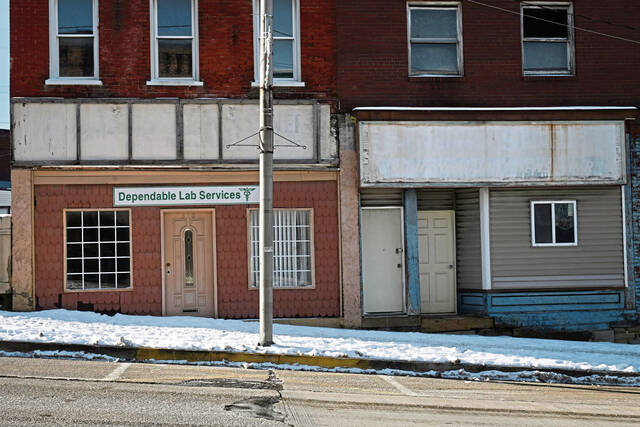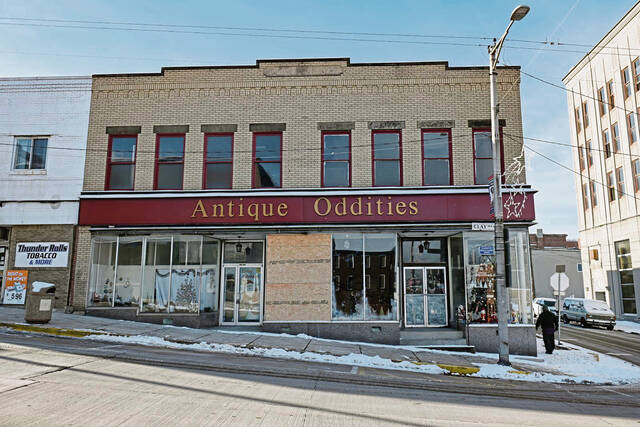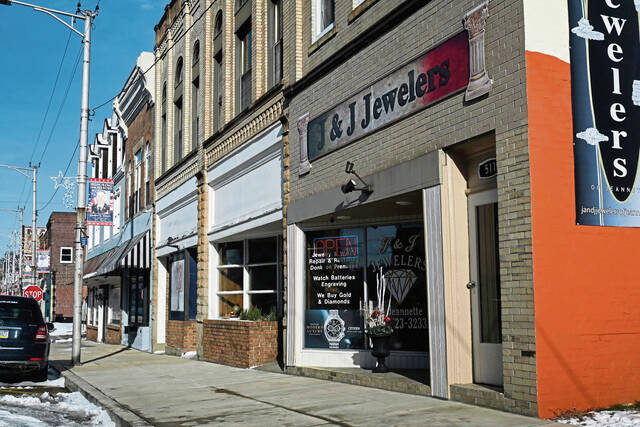The contrasts are stark on Clay Avenue in Jeannette.
Thriving businesses and eateries between the 200 and 600 blocks of the town’s business district are interspersed among abandoned or vacant buildings, many of which are ripe for redevelopment.
“Those places have been there through the good and the bad … so we owe it to them to hold the other buildings around them to the same standard,” said fire Chief Bill Frye.
Mayor Curtis Antoniak expressed frustration with the abandoned and empty buildings at city council meetings late last year. That concern has prompted renewed interest in enforcing a 2016 vacant property ordinance that sets the building standard.
Now, code officer Bill Whetzel will lean heavily into enforcement of the vacant property ordinance. Whetzel most recently has been taking stock of empty buildings on Clay Avenue that he said are in violation of the 2016 rule.
“We’re going to start enforcing that strictly. We have to,” Antoniak said.
Vacant and abandoned properties are required to be registered with the fire department within 180 days of becoming empty, and owners must pay an annual fee ranging from $250 to $5,000, depending on how long the vacancy has lasted. Properties with empty storefronts, a common sight on Clay Avenue, must have some kind of a window display or decorative screen approved by the fire marshal. Violations of the ordinance can result in a $500 fine.
“We need storefronts. We need people in these buildings,” Antoniak said. “That’s what we’re going to focus on.”
Councilwoman Michelle Langdon said business will attract more business, in addition to customers and commerce. Members of the Jeannette Business Association, for which she serves as secretary, have been discussing ways to help.
“The community’s on the way back … but why not use every square inch?” she said. “I want it filled to capacity down there.”
Clay Avenue has been a popular spot in recent years, with the association’s summer concert and food truck series at an amphitheater at South Fifth Street bringing hundreds of people to town. A few businesses have opened in the past couple of years to add to the mainstays that have been around for decades.
Rite Aid closes
The most recent vacant building is one that until this month was home to Rite Aid. The store’s closure was related to the company’s bankruptcy. There are more than 20 other buildings on Clay Avenue that are vacant in some form, whether it be an empty storefront that has apartments on the second level or an entire building with nothing in it.
Two are slated for demolition. A few have for sale signs in the windows. Several others are in various stages of being acquired and remodeled, such as the former PNC Bank building and a restaurant in the 500 block, according to city officials.
“There are a few of them that have people actively working on them, so those we don’t bother. They’re doing something,” Whetzel said.
Then there are the ones that are completely vacant.
The city cannot move to acquire the properties if tax payments are up to date, but it can put a lien on a property, which forces the owner to pay up if they want to sell. Code enforcement can be handled at district court.
For example, an unresponsive property owner in the 300 block is hampering efforts to expand a city parking lot as Jeannette has control of two neighboring properties, Frye said. He sent the owner a $29,000 bill after city crews cut a small strip of grass 96 times since 2017.
Another property owner a few doors down was cited for code violations that could be public safety hazards. A window is boarded up.
Elsewhere on the avenue are local and out-of-state owners whose buildings have been dormant. The hardest part is tracking out-of-state limited liability corporations, Frye said.
“It’s very frustrating because these people that are buying these buildings from out of town, they’re basically buying them … for purposes that I believe are not to benefit the city,” Antoniak said.
“I know there’s several, they just use them basically like storage units,” Langdon said.
Bright spots
But there are bright spots — the investors who are making a difference.
One of them is Matt Yanecko. His Trust Home and Earth contracting business has a Clay Avenue base, and Checko Properties, which he also owns, has been scooping up buildings.
Council recently authorized the transfer of two parcels, one of which was damaged in a 2020 fire, in the 400 block to the city’s redevelopment authority to facilitate a sale to Checko Properties for $1. Checko Properties also has control over a large parcel in the 200 block.
“There’s tons of potential on Clay Avenue in Jeannette,” Yanecko said. “I see it for what it can be and what it should be.”
He and city officials share a goal of having a business district with a variety of opportunities that attract people to visit and explore town. There’s no reason it can’t, but there have to be investors willing to take a risk, Yanecko said.
”I’d hate to see the buildings torn down,” he said.
It’ll take time, though. The developer of the former PNC Bank building, which is being turned into apartments, has been waiting 18 months for windows, Frye said. In the meantime, city officials want to focus on motivating property owners to fill their spaces.
“I think that it’s in our best interest to keep up on the code enforcement in the downtown area because we’re seeing more progress now than we have in 15 years,” Frye said. “We want to keep that momentum going.”

















